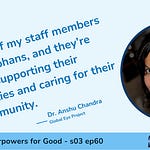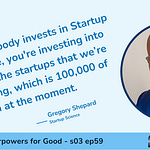Devin: What do you see as your superpower?
Joy: I believe my superpower is a commitment to show up.
“Our mission here at the Be the Match is pretty simple. It’s to save lives through cellular therapy,” says Joy King, Chief Advancement Officer. “Our vision is equal outcomes for all.”
“Every day, we recruit members to our registry. We call it the greatest waiting list in the world,” she says. “We work with patients who have been diagnosed with a blood cancer or blood disorder and need either a bone marrow or a blood stem cell transplant to cure their disease.”
There is a surprising and tragic disparity in match finding, she told me before we recorded our session. “If you are a white patient searching for a donor, you have a 79 percent chance of finding that life-saving match. That isn’t true if you are an African or Black American. You only have a 29 percent chance of finding a match. A 50 percent gap. It is really hard to live with those numbers.”
“It may be the largest disparity that exists in modern medicine,” she said, as we recorded.
One strategy Be The Match supports to end the disparity is treatments for people with relatively poor donor matches. The testing began with chemotherapy paired with stem cell therapy from “half-match” family donors. The outcomes were good.
Joy explains how extending the model to people without family donors seems to be working:
Because over 70 percent of patients don't have a suitable related donor—someone in their family that can donate to them—a little over five years ago, we started a trial to see if this same thing would work in the unrelated donor setting.
We consider a perfect match an eight out of eight match. So we were looking at a seven out of eight, six out of eight, and so on and so forth. We started to see that the outcomes for patients who were using a less than eight out of eight donor were similar. The outcomes, the survival rates were similar to those patients that had a perfectly matched donor.
We've been getting better and better over time, answering more and more questions. And it won't surprise anyone if you think about it and think about the disparity that I just talked about, that the majority of patients that are benefiting from these trials are patients who are ethnically diverse.
So the majority of patients that are participating in this trial and seeing good outcomes are those patients who otherwise wouldn't have an option on the donor registry. So it will completely change our ability to ensure that every patient can receive their life-saving therapy when they need us, which is incredible.
As we discussed this work, I wondered about the donor experience. Does it hurt? Finally, I asked. Joy walked us through it:
Almost 80 percent of the time—so the majority of the time when a donor donates—it is like a specialized blood donation. So, if you've ever given or seen someone donate plasma, it's very similar. For about a week prior to donation day, our donors receive a medication to boost up their stem cells.
Then they go in, and they get an IV in each arm. We take their blood out of one, spin it around in a machine, keep the things we need—their stem cells—and give everything right back to them. And so the procedure takes anywhere from four to eight hours usually, and then the donor is free to go and eat at Chipotle or whatever it is they want to do. Most of our donors that donate that day go right back to work.
The small percentage of the time, we still have donors who donate bone marrow, and that is an extraction from your hip. So it is a medical procedure. You're put under anesthesia.
Most of our donors would tell you what it feels like after is they're sore. They feel like either if you're from the north, Minnesota, it feels like maybe you fell on the ice or something. Other donors will say it feels like you did a really heavy squat workout—like your muscles are sore like that for a week or so after you donate.
So I wouldn't say that it's painless. I've never done it. I've spoken to several donors who would say they would do it over again in a heartbeat. Because of the altruistic people they are, they always say, “What I went through is nothing compared to what the recipient or the patient went through.”
Joy brings her superpower to work; she is deeply committed to showing up.
AI Podcast Summary
Joy King, Chief Advancement Officer of Be The Match, discusses the organization’s mission to save lives through cellular therapy.
They match patients diagnosed with blood cancer or disorders to a living donor on their registry for bone marrow or blood stem cell transplants.
Be The Match aims for equal outcomes for all patients, including through research and engagement with historically Black colleges and universities.
They fundraise and advocate for patients and donors to remove barriers to treatment or donation.
Joy finds her work fulfilling because they are delivering life-saving bone marrow and stem cells to patients in need.
Registering as a bone marrow donor is a simple process that involves a cheek cell sample for DNA typing.
African American potential donors are underrepresented in the registry.
Joy emphasizes the importance of showing up for others and being present to support them.
She shares a personal experience of supporting a colleague through a family tragedy and how her team rallied around him.
Listeners are encouraged to learn more about Be The Match and how they can donate or become a candidate donor.
How to Develop a Commitment to Show Up As a Superpower
Joy describes her superpower for showing up, saying, “Whether that means I’m showing up for my colleagues or my team, my family, a patient, their family, a donor, a benefactor—whatever the case may be—I believe that you only get one chance to show up to really show up.”
She shared a story to illustrate what it means to show up:
One of my colleagues who was traveling for work with another colleague, a direct report of mine. I got a call at about a little after midnight that there had been an emergency with my colleague’s family. I learned that my colleague’s baby passed away while they were traveling for work. His wife was home with the baby at the time.
That's a call no one obviously wants to receive, but also one as a friend and as a colleague I had never received before. So, you know, you just show up.
You do what it is you need to do to get him home, to be sure that he and his wife have what they need to get through a time like this and that he is confident that, at this time, work doesn't matter. What matters most is that he can be where he needs to be and do what it is he needs to do and not have to worry about anything else.
Joy shared another story as a metaphor to help us see how to emulate her, to remember to always show up.
An individual had cancer and it was terminal. What he talked about was comparing, of all things, life and chances to going to a driving range and how you get a bucket of balls and, as you start swinging, you just hit the ball over and over and over and over again.
You really don't think about it until you get down to those very few last balls. Then you really start to concentrate. You really start to pay attention to your form and your breaths and all of the things.
The point to that is not to wait till the end to be there. Make sure that you show up. Think about showing up for every opportunity that you have and not just waiting until the end.
And yes, it's a silly analogy, a bucket of golf balls, but you get the point, right? You never know when someone needs you to show up. And so if it's just popping your head into someone's office or sending a text or not canceling a coffee date because you're too busy taking a meal to someone who needs it. Whatever the case may be, don't miss the opportunity.
With that guidance and Joy’s powerful example, you can develop your own ability to show up, potentially making it a superpower that enables you to do more good in the world.
Guest-Provided Profile
Joy King (she/her):
Chief Advancement Officer/Executive Director, NMDP/Be The Match
About NMDP/Be The Match: Be The Match®, operated by the National Marrow Donor Program® (NMDP), is a nonprofit organization that’s dedicated to helping every patient get the life-saving transplant they need. As trusted leaders in advancing treatments for those facing life-threatening blood cancers, we provide the ground-breaking research, innovative technologies, patient support and education that save lives.
Website: bethematch.org
Twitter Handle: @BeTheMatch
Facebook Page: fb.com/BeTheMatch/
Linkedin: linkedin.com/company/bethematch
Instagram Handle: @bethematch
Biographical Information: Joy King is Chief Advancement Officer of Be The Match, operated by the National Marrow Donor Program and Executive Director of Be The Match Foundation. Joining the team in 2016, Joy’s primary role is to shape the foundation’s strategy, advance our brand and aid in overall direction of the organization. Her philanthropic work aids Be The Match in ensuring patients get the cellular therapy they need when they need it, helps patients live longer healthier lives, and offers hope for a cure to thousands more patients in need of cellular therapy.
In her time with Be The Match, Joy has secured the first of many principle gifts in the history of the organization. Additional successes include launching Be The Match Mexico, funding research programs to reduce post-transplant complications, providing increased grants for patient assistance, aiding in diverse recruitment to Be The Match Registry, and leads our first-ever comprehensive $100 million campaign.
Joy brings 23 years of experience to advance the life-saving mission of Be The Match. Her career began with American Cancer Society in 2000 as Field Representative for Relay For Life in Texas. Elevating to the role of Senior Vice President of Operations, for the Midwest division of the American Cancer Society overseeing 250 staff members with an annual fundraising goal of $32 million. She is passionate about curing cancer and serves as an executive leader, board member, and transformation catalyst.
Joy holds a Bachelor of Science degree from Tarleton State University, is a member of several Minneapolis-based and nationally recognized women leadership organizations, a board member for Be The Match Mexico, a board member of Women’s Health Leadership TRUST, as well as a member of the Association for Healthcare Philanthropy. Joy has also been recognized by the Minneapolis St. Paul Business Journals as a 2015 Women in Business and as a 2022 Notable Leader in Health Care by Twin Cities Business.
Twitter Handle: @joyking













